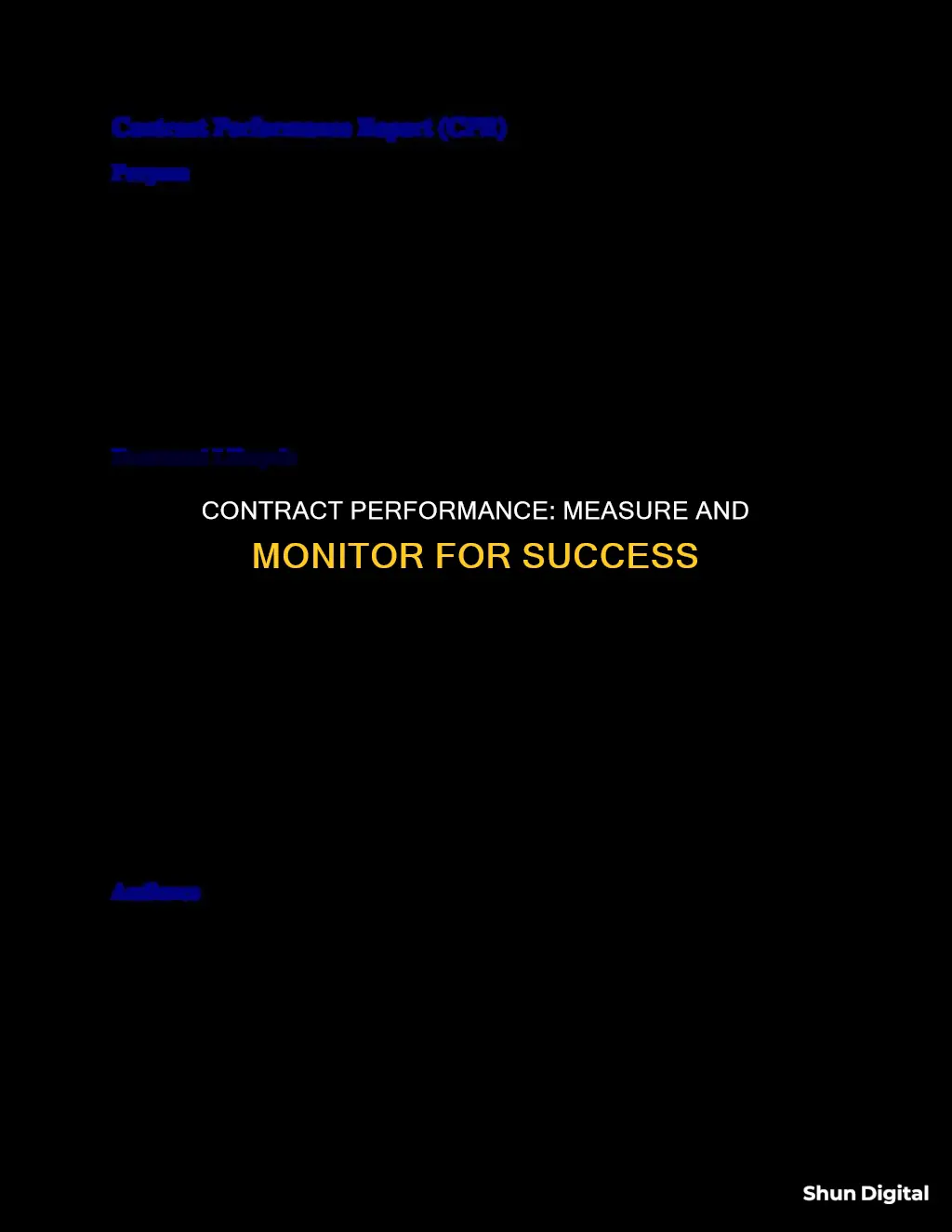
Measuring and monitoring contract performance is crucial for several reasons. Firstly, it allows organisations to evaluate the performance of the parties involved in the contract, ensuring that all contractual obligations are met. This helps to identify any issues or areas of non-compliance and enables companies to take appropriate measures to resolve problems. By regularly reviewing and analysing the contract, tracking performance indicators, and addressing potential risks, companies can minimise the chances of non-compliance, breaches, and other issues that could be costly and damaging to their reputation.
Secondly, effective contract monitoring helps to ensure compliance with applicable laws, regulations, and standards. By monitoring the performance of their contractors, organisations can reduce the risk of legal consequences and protect their reputation.
Thirdly, contract monitoring plays a vital role in maintaining healthy business relationships. It provides an opportunity for all parties to work together, fostering mutual respect and understanding. Additionally, it can help identify areas where adjustments or improvements can be made, ensuring that the contract remains relevant and valuable over time.
Finally, contract monitoring maximises the value of the contract by helping organisations identify new opportunities to create value and make any necessary adjustments as circumstances change. This ensures that the contract remains aligned with the organisation's goals and objectives, contributing to its overall success.
| Characteristics | Values |
|---|---|
| Evaluation of performance | Determine whether contractual obligations are being met by all parties and, if not, what improvements need to be made. |
| Minimise risk | Identify and mitigate risks before they become major problems, such as non-compliance, breaches of contract, and issues that can cost companies money and damage their reputation. |
| Ensuring compliance | Ensure that all parties comply with applicable laws, regulations and standards, thus reducing the risk to one's own reputation or legal status. |
| Maintaining healthy business relationships | Help to improve opportunities for cooperation and to recognise growth that can strengthen the business relationship. |
| Maximise value | Identify areas where adjustments need to be made or new opportunities to create value. |
| Timely contract execution | Meet agreed-upon timelines and schedules as outlined in the contract. |
| Continuous improvement | Implement feedback loops, conduct post-contract reviews, and learn from past experiences to refine contract management processes and ensure future deadlines are met more effectively. |
| Reliable | Focus on the ability of both parties to fulfill their contractual obligations consistently and dependably. Emphasise trustworthiness, consistency, and predictability. |
| Consistent quality | Deliver contract-related products, services, and outcomes that meet or exceed the established quality standards consistently throughout the contract duration. |
What You'll Learn
- Risk Management: Identify and address potential issues, including non-compliance, breaches, and financial losses
- Value Realisation: Ensure all parties meet their obligations to gain maximum value from the contract
- Relationship Management: Accurate assessment of performance strengthens relationships and encourages collaboration
- Continuous Improvement: Regular evaluation leads to process improvements and better efficiency
- Regulatory Compliance: Detailed documentation ensures compliance with legal standards and avoids penalties

Risk Management: Identify and address potential issues, including non-compliance, breaches, and financial losses
Risk management is a critical aspect of contract performance monitoring, helping to identify and address potential issues such as non-compliance, breaches, and financial losses. Here are some ways to effectively manage risks during contract performance monitoring:
Identify Potential Risks
It is important to identify potential risks associated with the contract, including legal, financial, and operational risks. By proactively identifying these risks, organizations can develop strategies to minimize their impact and manage them effectively. Regular monitoring and evaluation throughout the contract lifecycle are crucial to address dynamic risks and ensure the organization's resilience.
Implement Risk Mitigation Strategies
Once the risks have been identified, develop strategies to mitigate their impact. This may include contingency plans, insurance, or implementing specific procedures to reduce the likelihood of the risk occurring. For example, data breaches and ransomware attacks are common risks, and organizations should invest in secure data management systems and employee training to reduce the likelihood of a breach.
Monitor Compliance
Ensure that all parties involved in the contract comply with applicable laws, regulations, and standards. Non-compliance can lead to legal consequences, financial losses, and damage to the organization's reputation. Regularly monitor and assess the performance of the contracted parties to identify any areas of non-compliance and address them promptly. This includes monitoring the quality of the products or services provided, ensuring they meet the established standards and the organization's expectations.
Establish Key Performance Indicators (KPIs)
KPIs are essential to track the performance of the contract and identify potential issues. These metrics should be specific, measurable, achievable, relevant, and time-bound (SMART). Examples of KPIs include delivery times, quality, costs, and customer satisfaction. By tracking these indicators, organizations can identify areas where the contract is succeeding and areas that need improvement.
Regularly Review and Evaluate
At predefined milestones or the end of the contract, conduct a thorough review and evaluation of the contract's performance. Solicit feedback from all parties involved and identify any issues or risks that arose. Use this information to improve the contract management process and make any necessary adjustments to the contract terms or scope. Continuous improvement ensures that the contract remains effective and relevant over time.
Communicate and Document
Effective communication and documentation are vital in risk management. Communicate regularly with all stakeholders, including the contractor, clients, and internal teams. Document and track any issues, risks, or changes to the contract, ensuring that all parties are aware and aligned. This documentation will also serve as a reference for future contracts and risk management strategies.
Leverage Technology
Utilize technology and data analytics to monitor and manage risks effectively. Contract Lifecycle Management (CLM) software provides valuable insights and helps identify risks before they become problematic. These tools can track performance obligations, trigger alerts, and ensure visibility into contract end-dates and renewals. Additionally, automation reduces human error and streamlines the contract management process, making it easier to identify and address potential risks.
By implementing these risk management strategies, organizations can proactively identify and address potential issues during contract performance monitoring. This helps to minimize the impact of non-compliance, breaches, and financial losses, ultimately contributing to the success and sustainability of the organization.
Best Places to Buy Monitors in Ireland
You may want to see also

Value Realisation: Ensure all parties meet their obligations to gain maximum value from the contract
Measuring contract performance is a crucial aspect of contract management. It involves assessing how well the parties involved meet their obligations and achieve the goals outlined in the agreement. This includes evaluating the quality, punctuality, cost-effectiveness, and compliance with contract terms. Here are some reasons why ensuring that all parties meet their obligations is essential to gain maximum value from the contract:
Risk Management
Contract performance measurement serves as an early warning system, helping to identify risks such as non-compliance, inadequate performance, or unexpected results. By detecting these issues early on, companies can address them before they escalate, preventing potential financial losses, damage to reputation, and legal issues.
Value Realisation
When all parties involved in a contract meet their obligations, companies can maximise the value of their agreements. This goes beyond financial gains and includes strategic benefits such as fostering innovation, securing favourable market positions, and improving customer satisfaction. These benefits can significantly impact a company's profitability and potential for long-term growth.
Relationship Management
Accurate assessment of contract performance is crucial for building strong, collaborative relationships between all parties. It creates transparency and facilitates the peaceful resolution of disagreements. Over time, these positive interactions can lead to better negotiation outcomes, improved contract terms, and opportunities for joint projects or strategic partnerships.
Continuous Improvement
Regular evaluation of contract performance allows companies to identify areas for improvement and make necessary adjustments. By analysing performance data, companies can gain insights into their processes, streamline operations, and enhance overall efficiency. This cycle of evaluation and improvement helps organisations remain competitive, adapt to market changes, and better meet customer needs.
Regulatory Compliance and Reporting
In many industries, regulatory compliance is an integral part of contract management. Thorough measurement of contract performance ensures that companies can provide detailed documentation demonstrating their compliance with legal and regulatory standards. This not only helps avoid penalties and legal complications but also maintains the company's integrity and reputation with regulators, partners, and customers.
Ankle Monitors: Comfortable or a Constant Annoyance?
You may want to see also

Relationship Management: Accurate assessment of performance strengthens relationships and encourages collaboration
Accurate assessment of performance is a critical aspect of relationship management in the context of contract management. It serves as a foundation for building and strengthening relationships between the parties involved, fostering a collaborative and mutually beneficial environment. Here are some key ways in which accurate performance assessment strengthens relationships and encourages collaboration:
Fosters Mutual Respect and Understanding:
Accurate and transparent performance assessment demonstrates a commitment to fairness and objectivity. When all parties involved have a clear understanding of their respective contributions and achievements, it builds mutual respect and trust. This trust forms the basis for a more collaborative and harmonious relationship.
Enables Constructive Feedback and Improvement:
Regular and accurate performance assessments provide opportunities for constructive feedback. By identifying areas of strength and weakness, parties can provide targeted feedback to one another, fostering a culture of continuous improvement. This two-way feedback loop allows for the exchange of ideas, best practices, and suggestions for enhancing performance.
Encourages Open Communication:
Accurate performance assessment encourages open and honest communication between the parties. By creating a safe space to discuss achievements, challenges, and areas for improvement, relationships are strengthened. Effective communication ensures that issues are addressed promptly and that all parties are working towards mutually beneficial outcomes.
Enhances Collaboration and Teamwork:
Accurate performance assessment promotes a collaborative environment where parties are more inclined to work together towards shared goals. When performance metrics are clear and agreed upon, individuals are more likely to view themselves as part of a team, working collectively to achieve success. This sense of shared purpose strengthens relationships and encourages a culture of collaboration.
Facilitates Conflict Resolution:
Accurate performance assessment can help identify and address potential conflicts early on. By establishing clear performance metrics and regularly evaluating progress, parties can proactively identify areas of disagreement or non-compliance. This allows for timely and effective conflict resolution, strengthening relationships and maintaining a positive collaborative environment.
Builds Long-term Partnerships:
Accurate and consistent performance assessment contributes to the development of long-term, sustainable partnerships. When parties consistently meet their performance obligations and address issues in a timely manner, trust and confidence in the relationship grow. This, in turn, encourages collaboration and strengthens the foundation for future endeavours.
In conclusion, accurate assessment of performance plays a pivotal role in relationship management within the context of contract management. It fosters mutual respect, encourages open communication, enables feedback, and strengthens the collaborative environment. By regularly evaluating performance against clear metrics and key performance indicators (KPIs), organisations can build strong, long-lasting relationships with their partners, ultimately contributing to the success of the contract and the achievement of shared goals.
Is Your Internet Traffic Being Watched?
You may want to see also

Continuous Improvement: Regular evaluation leads to process improvements and better efficiency
Regular evaluation of contract performance is essential for organisations to improve their processes and enhance efficiency. By assessing performance data, companies can identify areas where they can streamline processes, adjust strategies, and improve overall efficiency. This cycle of evaluation and improvement helps businesses remain competitive, adapt to market changes, and better meet customer needs.
Contract monitoring provides an opportunity to evaluate the performance of suppliers and buyers in the contractual relationship. It helps organisations determine whether contractual obligations are being met and, if not, what improvements need to be made. This enables companies to maintain strong, collaborative relationships with their contractors and suppliers.
Additionally, regular contract evaluation helps identify potential risks such as non-compliance with contract terms, inadequate performance, or unexpected results. By identifying these issues early on, companies can address them promptly and prevent them from becoming major problems. This proactive approach contributes to effective risk management and helps avoid potential financial losses, reputation damage, and legal issues.
Contract management software plays a crucial role in continuous improvement. These software solutions provide advanced analytical tools that measure performance using various metrics, enabling companies to assess the value and effectiveness of their contracts in real time. The data and insights gained from these tools facilitate strategic decision-making and process improvements.
Furthermore, contract management software offers features such as automated performance tracking, customisable dashboards, and collaboration tools. Automated performance tracking goes beyond simple monitoring by actively analysing key performance indicators (KPIs) and compliance metrics. Customisable dashboards make contract data more accessible and relevant to different users, improving the decision-making process. Collaboration tools facilitate effective communication and document sharing among teams, ensuring everyone stays aligned during the contract development and execution.
In conclusion, regular evaluation of contract performance through continuous improvement practices helps organisations streamline processes, adapt to market changes, and enhance overall efficiency. By leveraging contract management software and analytical tools, companies can make data-driven decisions and continuously improve their contractual relationships and internal processes.
Connecting Xbox to a Monitor Without HDMI: Alternative Methods
You may want to see also

Regulatory Compliance: Detailed documentation ensures compliance with legal standards and avoids penalties
Regulatory compliance is a critical aspect of contract monitoring. It ensures that all parties involved in the contract adhere to the relevant laws, regulations, and standards, reducing the risk of legal consequences and reputational damage. Here are some reasons why detailed documentation is essential for regulatory compliance:
- Accountability: Clear and detailed documentation establishes stakeholder accountabilities, promoting diligence and professionalism. It helps identify who is responsible for specific tasks and ensures that everyone involved is held accountable for their obligations.
- Avoidance of Unforeseen Consequences: Inconsistent or unreliable compliance measures can lead to unexpected issues such as inadequate risk management, operational disruptions, or legal complications. Detailed documentation helps mitigate these risks by providing a comprehensive record of compliance activities.
- Business Relationship Quality: Proper documentation fosters positive relationships between parties, which is essential for long-term partnerships and collaborations. It demonstrates a commitment to transparency and mutual understanding, strengthening the business relationship.
- Competitive Advantage: Robust and reliable compliance measures, supported by detailed documentation, can enhance a company's reputation for quality, integrity, and reliability. This can result in a competitive edge in the industry and attract potential clients or partners who value compliance and ethical standards.
- Financial Stability: Detailed documentation ensures that all parties receive the agreed-upon benefits and that payments are made as scheduled. This contributes to financial stability for all involved and reduces the risk of financial disputes.
- Legal Obligation: Contracts are legally binding, and failure to comply can result in legal consequences, including breaches of contract and potential lawsuits. Detailed documentation provides evidence of compliance with legal requirements, reducing the risk of legal issues.
- Operational Efficiency: Effective compliance measures, supported by thorough documentation, streamline operational processes and improve efficiency. It ensures that operations are conducted according to established standards, reducing inefficiencies and costs.
- Predictability and Planning: Detailed documentation allows parties to confidently plan their operations and allocate resources, knowing that contractual commitments will be met. It provides a clear framework for delivering on obligations and managing expectations.
- Quality Assurance: In contracts involving the delivery of goods or services, detailed documentation ensures that quality standards are met. It enhances customer satisfaction and reinforces the reputation of the vendor.
- Reputation Management: Compliance with contractual obligations is essential for maintaining a positive business reputation and credibility in the marketplace. Detailed documentation demonstrates a commitment to honouring agreements and helps build trust with clients and partners.
- Risk Mitigation: Thorough documentation reduces the likelihood of disputes and unexpected liabilities. It provides a clear record of compliance with contract terms, reducing the potential for misunderstandings or conflicting interpretations.
- Strategic Decision-Making: Reliable compliance data and documentation enable informed strategic decision-making. Businesses can identify areas for improvement and align their strategies with regulatory requirements, minimising risks and optimising their operations.
- Third-Party Trust: Third-party entities, such as investors, customers, or partners, are more inclined to trust businesses that maintain the integrity of their operations through a demonstrable commitment to compliance with legal and ethical standards. Detailed documentation provides evidence of this commitment.
Monitoring Machine Learning Model Performance: Strategies for Success
You may want to see also
Frequently asked questions
Measuring and monitoring contract performance is important because it allows you to evaluate the performance of the parties involved in the contract. It helps to ensure that all parties are meeting their contractual obligations and achieving the goals set out in the agreement. This includes assessing the quality, punctuality, cost-effectiveness, and compliance with contract terms.
Measuring and monitoring contract performance offers several benefits, including risk management, value realisation, relationship management, continuous improvement, and regulatory compliance. It helps identify potential issues and risks, such as non-compliance or inadequate performance, and enables companies to address them proactively. Additionally, it helps ensure that the contract remains relevant and valuable over time and facilitates the building of strong, collaborative relationships between all parties.
The key metrics for measuring contract performance include cost, punctuality, reliability, and consistent quality. Cost metrics involve comparing actual costs against planned budgets to assess the value for money. Punctuality refers to the timely execution of contractual obligations, milestones, and deadlines. Reliability focuses on the ability of both parties to consistently fulfil their obligations. Consistent quality refers to maintaining high standards throughout the contract duration.
Technology, such as contract management software, AI, and machine learning, can greatly assist in measuring and monitoring contract performance. Contract management software provides advanced analytical tools to measure performance using various metrics and enables real-time assessment of the value and effectiveness of contracts. AI and machine learning can provide predictive insights, identify patterns, and make recommendations for optimisations.







